|
|
|
Sort Order |
|
|
|
Items / Page
|
|
|
|
|
|
|
| Srl | Item |
| 1 |
ID:
191077
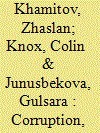

|
|
|
|
|
| Summary/Abstract |
Kazakhstan, seen as an example of political stability in Central Asia, recently descended into political turmoil. While the causes of the violence and unrest are the subject of ongoing analysis, their origins can be linked to systemic inequalities in a country rich in natural resources. Inter alia, Kazakhstan has failed to tackle insidious problems of corruption, particularly in public procurement contracts. Public procurement constitutes a significant amount of government spending in developing countries which makes it a high-risk area for corruption. Using primary data collected from small and medium-size enterprises organisations in Kazakhstan, this research finds that public officials and suppliers are complicit in corrupt practices. Intervention strategies, such as monitoring and control, have failed to tackle this problem. While the causes of recent political instability in Kazakhstan are multiple, corruption remains an underlying and persistent problem which will add to the fermenting discontent among the citizens of Kazakhstan.
|
|
|
|
|
|
|
|
|
|
|
|
|
|
|
|
| 2 |
ID:
077134
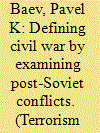

|
|
|
|
|
| Summary/Abstract |
Great many violent events happened during 1991-2005 in the 12 states that emerged after the collapse of the USSR but only a few civil wars are registered in the major datasets. That brings up a number of questions about the operational definitions of civil war that generally point in the direction of shifting the research attention from refining the quantitative parameters to grasping the essense of the phenomena in question. It is proposed that civil war partially overlaps with several other type of violent crisis: inter-state wars, civil unrest and revolutions, internal repression, military coups and mutinies, banditry and organized crime, and terrorism. These overlaps create six 'gray zones' where only very nuanced examination rather than application of rigid criteria could help in distinguishing civil wars from other crises. Therefore, data collection based on a single "robust" definition, which incorporates several verifiable parameters, is not necessarily the only path to scientific knowledge about civil wars
|
|
|
|
|
|
|
|
|
|
|
|
|
|
|
|
| 3 |
ID:
188820
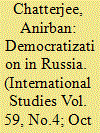

|
|
|
|
|
| Summary/Abstract |
Russia being the largest successor state among the post-Soviet countries, its distinct civilization, unique history, and contribution to various fields has earned interest among scholars. Moreover, it was also perceived that since Russia straddles two continents, Asia and Europe, any development in Russia will either have a direct or an indirect bearing on Europe and Asia. These factors have collectively generated a great amount of scholarly interest in studying post-Soviet Russian democratization. The article focuses on the aspects of the convergence and divergence of these entities in the case of the Russian Federation. In this endeavour, the article chalks out the key components of democratization and their interplay in Russia. An attempt is made to understand the perception of democracy among Russians and whether democratic reforms in post-Soviet Russia led to any change of perception among Russians about democracy. The article also unravels the institutional dynamics in order to ascertain the Russian experience of democratization. The article concludes with some recommendations for future course of actions with regard to democratization.
|
|
|
|
|
|
|
|
|
|
|
|
|
|
|
|
| 4 |
ID:
073617
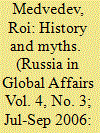

|
|
|
|
|
| Publication |
2006.
|
| Summary/Abstract |
Successful self-identification within the post-Soviet states often involves taking a new look at one's national history. Not all titular nations in the CIS had states of their own in the past, but all of them had a history on which to build their national self-consciousness.
|
|
|
|
|
|
|
|
|
|
|
|
|
|
|
|
| 5 |
ID:
127675
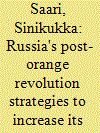

|
|
|
|
|
| Publication |
2014.
|
| Summary/Abstract |
The role of public diplomacy in Russian foreign policy has grown in recent years. There are two distinctive strands of Russian public diplomacy: one directed mainly towards Western states, and one towards the former Soviet republics. Despite the rhetoric of mutual interests and high respect for state sovereignty, the post-Soviet strand of Russian public diplomacy has more in common with the Soviet practice of 'active measures' than with the soft power of attraction commonly connected with public diplomacy. Russia's current policy runs the risk of eating away the soft power potential that Russia still enjoys in many post-Soviet states.
|
|
|
|
|
|
|
|
|
|
|
|
|
|
|
|
| 6 |
ID:
190462
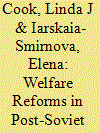

|
|
|
|
|
| Summary/Abstract |
In recent years, the Russian government has adopted major social policy reforms that incorporate contemporary state-of-the-art international principles and practices. New legislation has mandated deinstitutionalisation, that is, closing Russia’s large network of residential facilities for children ‘without parental supervision’ (‘deti bez popecheniya roditelei’)Footnote1 and people with disabilities. Programmes of foster care and adoption are emptying orphanages, while efforts have been made to reorient efforts of social workers and family courts towards preserving families. Children with disabilities are being moved out of institutions and integrated into public schools, while adults now have possibilities to live and work in communities that have been made more accessible. ‘Active Ageing’ policies are designed to enhance the agency and self-determination of older people. Schools have begun to integrate the children of migrant workers. Some social service provision has been outsourced to socially-oriented non-governmental organisations (SONPOs; see Cook et al. Citation2021) in order to allow a choice of providers and services. While the progress of these reforms has been uneven, collectively they reflect the Russian government’s efforts towards integrating into mainstream society groups that have for decades been marginalised or institutionalised.
|
|
|
|
|
|
|
|
|
|
|
|
|
|
|
|
|
|
|
|
|